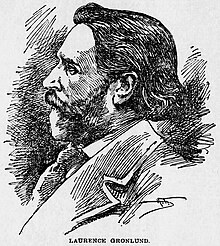Laurence Gronlund
| Laurence Gronlund | |
|---|---|
 |
|
| Born |
July 13, 1846 Copenhagen, Denmark |
| Died | October 15, 1899 (aged 53) New York City, New York, United States |
| Occupation | Writer, lecturer, and political activist |
| Nationality | American |
| Spouse | Beulah A. Gronlund |
Laurence Gronlund (1846–1899) was a Danish-born American lawyer, writer, lecturer, and political activist. Gronlund is best remembered for his pioneering work in adapting the International Socialism of Karl Marx and Ferdinand Lassalle to the American idiom in his popular 1884 book, The Cooperative Commonwealth, and for his influence upon the thinking of utopian novelist Edward Bellamy, newspaper publisher Julius Wayland, and the American socialist movement of the 1880s and 1890s.
Laurence Gronlund was born in Copenhagen, Denmark, on July 13, 1846, the son of a minister. He was a participant in the Danish–German War of 1864.
Gronlund graduated from the University of Copenhagen's Faculty of Law in 1865, and emigrated to the United States two years later.
For a short time he taught German in a public school in Milwaukee prior to his 1869 admission to the bar and the opening of a law practice in Chicago.
Gronlund was converted to the ideas of socialism and gave up the practice of law in order that he might write and lecture on matters of collective ownership. Gronlund joined the German-American dominated Socialist Labor Party (SLP), a political party still in its infancy, and in 1878 published his first work, a pamphlet entitled The Coming Revolution: Its Principles. Gronlund was a firm advocate of trade union-based, German-style International Socialism, in contrast to various communitarian schemes then in vogue in the United States.
In 1884 Gronlund published his most influential and best remembered work, a small volume titled The Cooperative Commonwealth. This book attempted to popularize Karl Marx's ideas about the labor theory of value and the fundamentally exploitative nature of competition within the capitalist system. The working class, forced to scramble for survival under the competitive system, was depicted as the "natural prey" of small shopkeeper "parasites" who existed by inflating selling prices and deprecating quality. Moreover, the "big capitalists" were said to wield a still more powerful weapon, that of combination, which made possible more efficient "fleecings" of working people.
...
Wikipedia
